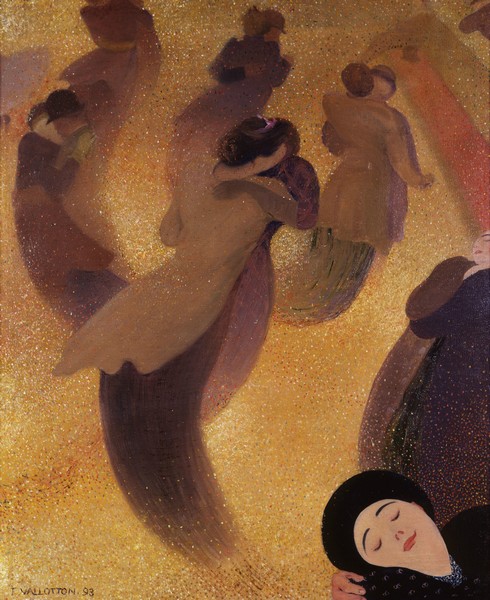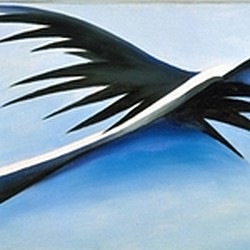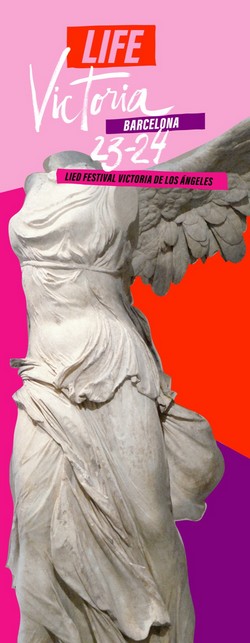
Among the many good things Brahms did, there is the edition of Schubert's works which, forty years after his death, remained still in a drawer. For instance, the Zwölf Ländler, a collection of twelve waltzes composed in 1823 and catalogued by Otto Deutsch as D. 790, published by Brahms in 1864. In 1866, the composer published his Sechszehn Walzer, Op. 39, a collection of waltzes for piano four-hands. The edition was a sales success. The pieces were charming, the four-hand format was ideal for Hausmusik, that's to say, music to be played in gatherings in the home, and Vienna was enthusiastic about waltzes since the time of Johann Strauss I and Joseph Lanner. In view of the good reception, Brahms made a two-hands version of Op. 39 and later a new, easier four-hands arrangement that brought the work within more people's reach.
In 1869, he made his publisher happy with a new collection of piano four-hands waltzes, his Op. 52 (that same year he had published one more collection of waltzes by Schubert, which today are D. 366 and D. 814, the latter four-hands as well). That time, however, the waltzes were songs, although publisher Simrock added to the publication the indication "singing ad libitum", i.e., that singing was optional; it was probably a hidden message for the buyers of the op. 39 that would prefer a piano work. Brahms's new work was called Liebeslieder Walzer, "Love Songs Waltzes"; the word liebeslieder refers to a work by Schumann, the Spanisches Liebeslieder, Op. 138, for four voices and piano four-hands; this is also the ensemble that Brahms uses.
The texts of these songs were by Georg Friedrich Daumer, whom we know here on Liederabend from other Brahms' lieder such as Nicht mehr zu dir zu gehen, Wie bist du, meine Königin or Wir wandelten; he was one of his favorite poets and became his most musicalized. Daumer (who lived far from the madding crowd, absolutely unaware of Brahms), had published in 1855 a collection of poems called Polydora, which was subtitled Ein weltpoetisches Liederbuch ("A world-poetic songbook"). There were translations into German of brief Russian, Lithuanian, Polish, Hungarian, Turkish or Sicilian love poems. In fact, we should talk about versions rather than translations, because the poet wasn't interested on translate to the letter but in convey the spirit of the texts. Brahms chose sixteen varied poems that turned into also varied songs; there are elegant, melancholy, passionate or humorous pieces.
Before I propose one of the lieder, and since I've talked about waltzes and ländler as if the two words were synonymous, just a few lines to make it clear that they aren't, although both were originally similar, folk dances. Do you remember Captain Von Trapp and Maria dancing in The sound of music? That's a ländler. We all know that waltz evolved to a symphonic form; ländler are also heard at concert halls, but in a more intimate way, thanks to Schubert, for instance. To simplify, and given that Brahms' cycle is written in the Strauss's time, we could say that ländler are simpler and waltzes, more elaborated. If I insist on this it's because, at the scores of the Liebeslieder Walzer, Brahms refers to the pieces as ländler, that is, in a way he is telling us that there are composed in the way Schubert did, and not in the way Strauss did.
Out of the sixteen waltzes, twelve are four-voice, two are solo and the other four are duets: two soprano-mezzo and two tenor-baritone duets. Last week we listen to a four-voice song and I suggest listening to one of the male duos, with the same performers: Matthew Polenzani, Thomas Quasthoff, James Levine and Yefim Bronfman. It's Sieh, wie ist die Welle klar, the no. 14 of the cycle, immediately preceding Nachtigall, sie singt so schön that we heard a week ago.
Sieh, wie ist die Welle klar,
Blickt der Mond hernieder!
Die du meine Liebe bist,
Liebe du mich wieder!
See how clear the waves are
when the moon gazes down!
You who are my love,
you love me back!
(translation by Emily Ezust)


 We left...
We left... In 1848...
In 1848... If I tel...
If I tel...











Comments powered by CComment